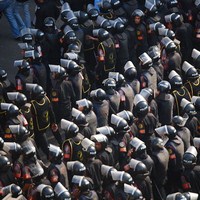In March 2011, after Hosni Mubarak’s fall, when Egyptian protesters stormed and ransacked the offices of State Security Investigations (SSI) throughout the country, it appeared that efforts to reform Egypt’s chastened police force had achieved broad social and political consensus. Yet, two years later, accountability for past crimes, including those committed during the uprising, remains lacking, and the Ministry of Interior remains wholly unreformed and often brutal.
Scenes of police violence have once again become commonplace, reaching a peak in Port Said in late-January, when more than 30 people, including two police officers, were killed. This weekend’s bloody clashes in Port Said left three civilians and three police dead. Meanwhile, today’s Muslim Brotherhood-led government, much like Egypt’s post-Mubarak interim military leaders, continues to seek security solutions to the country’s intractable political crises and cycles of protest.
Before the unexpected outpouring of protest that began on Jan. 25, 2011 -- Egypt’s Police Day -- police repression, including coercion, torture and forced confessions, was a constant theme of opposition grievances. Routine interactions with the police often resulted in abuse. Emblematic of this brutality was the June 2010 murder of Khaled Said, a young Alexandrian activist killed in police custody. His murder, and the “We Are All Khaled Said” campaign it inspired, marked a new public awareness of police brutality and played an important role in galvanizing a critical mass of protesters.

